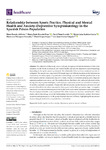Mostrar o rexistro simple do ítem
Relationship between Sports Practice, Physical and Mental Health and Anxiety–Depressive Symptomatology in the Spanish Prison Population
| dc.contributor.author | Penado Abilleira, María | |
| dc.contributor.author | Ríos-de-Deus, María-Paula | |
| dc.contributor.author | Tomé-Lourido, David | |
| dc.contributor.author | Rodicio-García, María-Luisa | |
| dc.contributor.author | Mosquera-González, María-José | |
| dc.contributor.author | López-López, Daniel | |
| dc.contributor.author | Gómez Salgado, Juan | |
| dc.date.accessioned | 2023-04-26T09:15:06Z | |
| dc.date.available | 2023-04-26T09:15:06Z | |
| dc.date.issued | 2023-03-07 | |
| dc.identifier.citation | Penado Abilleira, M.; Ríos-de-Deus, M.-P.; Tomé-Lourido, D.; Rodicio-García, M.-L.; Mosquera-González, M.-J.; López-López, D.; Gómez-Salgado, J. Relationship between Sports Practice, Physical and Mental Health and Anxiety–Depressive Symptomatology in the Spanish Prison Population. Healthcare 2023, 11, 789. https://doi.org/10.3390/healthcare11060789 | es_ES |
| dc.identifier.issn | 2227-9032 | |
| dc.identifier.uri | http://hdl.handle.net/2183/32941 | |
| dc.description.abstract | [Abstract] The objective of this study was to evaluate, in a group of Galician inmates, if there were variations in the levels of physical and mental health and anxiety–depressive symptomatology, depending on the sports’ practice performed. The relationship between these constructs was also investigated. The sample was composed of 509 people deprived of liberty in prisons in the Autonomous Community of Galicia, Spain. A quantitative methodology was used, with the questionnaire as an information collection instrument, Student’s t-tests, Pearson’s correlation analysis and a stepwise regression analysis were carried out. The results indicated that those who performed physical activity during their stay in prison had higher levels of physical and mental health, as well as lower indicators of anxiety–depressive symptoms. People who did not practice sports showed a decrease in their perceived health levels when compared to those perceived in their pre-prison stage. A negative association was shown between perceived health levels and anxiety–depressive symptomatology. Perceived physical health, alone, explained 35% of the variance in perceived mental health. These results add to knowledge about the relationships between perceived health, anxiety–depressive symptoms and sports practice in the group of people deprived of liberty, highlighting the importance of promoting physical activity in penitentiary institutions. | es_ES |
| dc.language.iso | eng | es_ES |
| dc.publisher | MDPI | es_ES |
| dc.relation.uri | https://doi.org/10.3390/healthcare11060789 | es_ES |
| dc.rights | Atribución 3.0 España | es_ES |
| dc.rights.uri | http://creativecommons.org/licenses/by/3.0/es/ | * |
| dc.subject | Health | es_ES |
| dc.subject | Sports practice | es_ES |
| dc.subject | Anxiety | es_ES |
| dc.subject | Depression | es_ES |
| dc.subject | Prisons | es_ES |
| dc.subject | Inmate | es_ES |
| dc.subject | Wellness | es_ES |
| dc.title | Relationship between Sports Practice, Physical and Mental Health and Anxiety–Depressive Symptomatology in the Spanish Prison Population | es_ES |
| dc.type | info:eu-repo/semantics/article | es_ES |
| dc.rights.access | info:eu-repo/semantics/openAccess | es_ES |
| UDC.journalTitle | Healthcare | es_ES |
| UDC.volume | 11 | es_ES |
| UDC.issue | 6 | es_ES |
| UDC.startPage | 789 | es_ES |
Ficheiros no ítem
Este ítem aparece na(s) seguinte(s) colección(s)
-
UI-FORVI - Artigos [11]
-
GI-UDISAP - Artigos [193]






